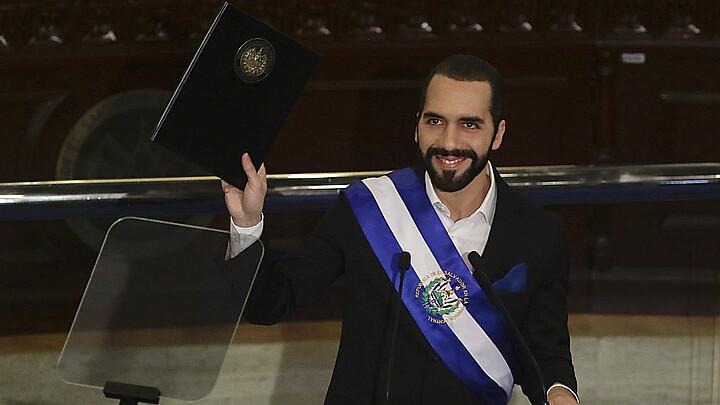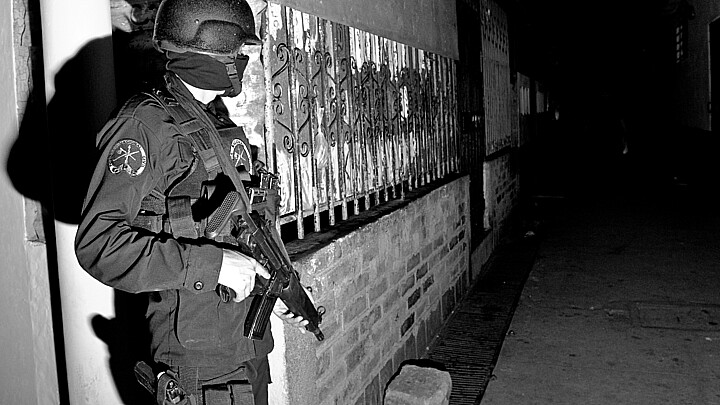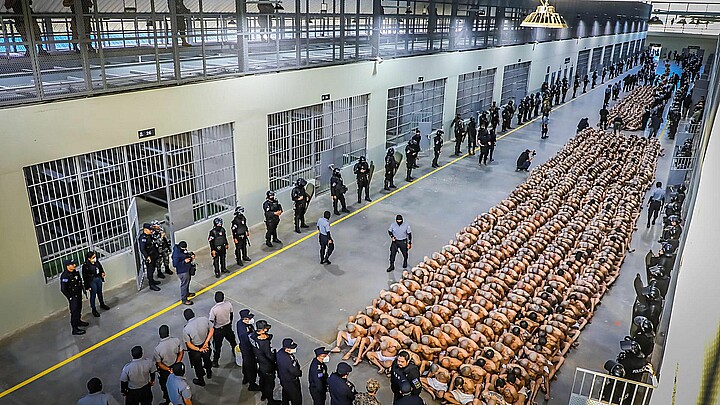Politics
President Nayib Bukele declares victory in El Salvador elections, amidst constitutional controversy
In a bustling square, thousands of Salvadorans gathered in front of the National Palace adorned with flags, t-shirts, and caps in the distinctive sky-blue hue of Bukele's New Ideas (NI) party

February 5, 2024 8:46am
Updated: February 5, 2024 11:25am
President Nayib Bukele won by a landslide in the El Salvador elections on Sunday, as voters put aside concerns about the erosion of democracy and rewarded him for his tough stance on gangs, which has greatly enhanced security in the Central American nation.
In a bustling plaza, thousands of Salvadorans gathered in front of the National Palace wearing flags, t-shirts, and caps in the distinctive sky-blue hue of Bukele's New Ideas (NI) party. Voters celebrated his new presidential term with a grand spectacle, a fitting display from the former publicist, featuring a breathtaking aerial performance with numerous blue-lit acrobatic drones forming the letter "N."
When the digital tallying by the Supreme Electoral Tribunal ceased late on Sunday, the 42-year-old former mayor of San Salvador had garnered an impressive 83% of the vote, establishing a substantial lead over his closest rival, who secured a mere 7% and represented the leftist Farabundo Martí National Liberation Front. The electoral website responsible for updating the count experienced technical difficulties shortly before midnight.
Despite the challenges in the vote count, a jubilant Bukele proclaimed a historic margin of victory even before the release of the initial preliminary figures on Sunday evening. Issues persisted with the vote count, with only 31% of polling places having their ballots tallied—a statistic that remained unchanged on the Supreme Electoral Tribunal's preliminary results website on Monday morning.
A few hours later, the first congratulations to the president would arrive. Panama, Mexico, Guatemala, Honduras, Ecuador, and Peru were the first countries to recognize Bukele's victory.
Magistrate Guillermo Wellman of the Supreme Electoral Tribunal (TSE) said Sunday night that the results announced by President Nayib Bukele when he proclaimed himself the winner of the presidential elections were not official.
"We are the ones who provide the official results," he told reporters when asked whether the percentages mentioned by Bukele were official or not. He emphasized, "We are the referees."
Early on Monday, the electoral authority released a statement acknowledging "multiple actions that hindered the development of the transmission activities of preliminary results" and a shortage of paper for printing vote tallies at polling stations.
Consequently, they urged the voting boards at each polling station to transition to a contingency process, which included manually tallying votes, capturing photographs or scans of these manual tallies, and forwarding them to the Supreme Electoral Tribunal.
During the vote casting, the Association of Journalists of El Salvador (APES) reported at least 110 attacks on the press, a number even higher than the one recorded in a single year by this profession.
At the official closing time for voting, Bukele said that many Salvadorans living abroad were unable to cast their votes because polling stations were closed, even though numerous people were waiting in line. "This is a crime in our country, and those responsible will be prosecuted," he warned.
President Nayib Bukele of El Salvador shared several videos on the social platform X on Sunday, showcasing Salvadoran voters participating in the presidential and legislative elections at various polling centers across the United States.
In one video from New Jersey, voters were seen enthusiastically chanting "Bukele" with their hands raised. The United States is home to the largest Salvadoran diaspora abroad, with data from the Migration Policy Institute (MPI) indicating that over 1.4 million Salvadorans resided in the country in 2021, with half of them lacking legal status.
A report from the Pew Research Center estimated that as of 2021, 2.5 million Latinos were identifying as Salvadorans, with 52% of these immigrants having lived in the United States for over two decades.
Bukele has been glorified by many Salvadorans who long to see their homeland return to law and order.
During his first term, he waged a war against Salvadoran gangs and built a super-prison exclusively to incarcerate their members. While his tactics have come under fire by many, few have denied that his iron grip on the country reformed El Salvador from one of the most crime-ridden, dangerous nations in the region to one of the safest.
Since Bukele was elected in 2019, El Salvador’s murder rate has fallen by 50 percent, but civil liberties organizations have complained that his war against crime has resulted in wrongly accused people being locked up.
To date, the Salvadoran president has reportedly arrested about 75,000 people under a special state of emergency he declared and extended.
According to a December Amnesty International report, the human rights group described the situation in the Central American country as the “gradual replacement of gang violence with state violence.”
Bukele was initially barred from running by the Salvadoran constitution, but was given a waiver by the Supreme Court, which is packed with his own appointees.
To skirt the constitutional issue, Bukele temporarily stepped down several weeks ago to allow an interim period so he could argue he was not serving two consecutive terms. If his election results
Bukele nominally stepped down as president several weeks ago to fulfil that requirement. Should his election victory be borne out, he will be sworn into office in June.
While he has styled himself as “the world's coolest dictator,” a December Amnesty International report described the situation in El Salvador as the “gradual replacement of gang violence with state violence.”
This report includes contributions from wire reports including EFE, Reuters and the Associated Press.











